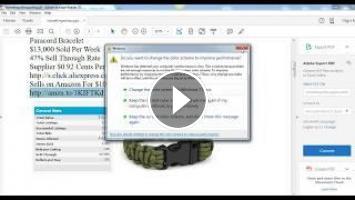LINKS TO THESE PRODUCTS
http://rulesforrebels.blogspot.com/2015/10/how-i-do-250000-month-selling-alibaba.html
How to Create Shopify Product Pages That Convert into Sales
https://gumroad.com/rulesforrebels#sfjuet
Shopify 30 Day Trial
http://bit.ly/26SUDFb
Jungle Scout Analytic Tool
http://affiliate.junglescout.com/idevaffiliate.php?id=618
Find Shopify Products & Niches + Spy on Competitors https://shopinspect.idevaffiliate.com/109020.html
Jungle Scout Analytic Tool
http://affiliate.junglescout.com/idevaffiliate.php?id=618
SETUP YOUR OWN SHOPIFY STORE
http://bit.ly/26SUDFb
eCommerce is not rocket science, it's simply the process of finding products which sell well on platforms like eBay, Amazon, Etsy, or your own Shopify store or WooCommerce store.
You want to find products which you can source cheaply either from Chinese suppliers and manufacturers on sites like Ali Express, Alibaba, Saleshoo, or domestically through something like ThomasNet. You want to find products which you can buy cheaply on those platforms and resell for more money on eBay, Amazon, Etsy, Shopify, etc.
My intention with this post isn't to have you run off and sell these exact products. It's to show you the process, to show you how to find items, etc. While you can probably make money just copying this exact method I would rather see you use the overall concept to find your own products and niches which you can sell.
Money can be made selling random one off products, however a better way to build a longer term sustainable business with better margins, less competition, and loyal customers who make recurring purchases is to stick within a niche. Rather than selling a mixing bowl today and a tactical pen tomorrow you find a niche to settle into in which you can build content, a social media following, etc and then market and sell to that audience.
If your selling all kitchen goods or cooking items people may buy multiple items from you or come back and make more purchases. If your selling a nintendo controller extension today and a pair of Yoga socks tomorrow your items are not crossover purchase items that the same consumer will buy, however if your selling multiple items in the Yoga niche for example there's a good chance the buyer who purchases Yoga socks will come back for a Yoga mat.
Something I hear alot is how can we possibly compete with the low prices of Chinese manufacturers selling direct to consumers on platforms like eBay and Amazon. While that is making selling more challening, pricing isn't as big an issue as you may think.
Sure someone can buy an item for $2 form a Chinese seller but it will take 4-6 weeks to arrive, the quality may be spotty, the listing probably isn't well written, and returns are difficult, often leaving the buyer paying expensive return shipping.
Simply by putting together quality listings with good pictures and descriptions you can often outrank the manufacturers and sell for a higher price by that alone. You can also employ strategies like bundling products and private labeling which can also help you sell your products at higher prices than the manufacturers and suppliers are offering them for. I explain that in more detail below.
Bundling refers to packaging items together. Let's take for example something like the fire starter. You can buy this for 0.20 cents and maybe sell it for a couple bucks right? Okay, well what if we now add a fire starter, a compass, a paracord bracelet and a folding credit card knife. All these items are very cheap. We could probably buy one of each for say $1. When we bundle these items together and call it a "Survival Pack" something along those lines we create added perceived value and can maybe get $16.95 for these 3 or 4 items which maybe cost us a buck and some change at most.
How does private labeling add value to a product?
Most people prefer buying brands as opposed to generic products. Sometimes it's because the brand product is superior, while other times peole just like a fancy name on a box. Think about it, if your at a store and your looking to buy a HDMI cable. Are you going to buy the one in the clear plastic bag with no name that just says "HDMI Cable" or are you going to buy the one in the box called "Lightening Cable" that has diagrams showing how the connections are gold, its faster than other HDMI cables, etc. Most people will probably opt for the branded item. Same thing with most other products, people want a branded product more and will typically pay a couple extra bucks to get it.
http://rulesforrebels.blogspot.com/2015/10/how-i-do-250000-month-selling-alibaba.html
How to Create Shopify Product Pages That Convert into Sales
https://gumroad.com/rulesforrebels#sfjuet
Shopify 30 Day Trial
http://bit.ly/26SUDFb
Jungle Scout Analytic Tool
http://affiliate.junglescout.com/idevaffiliate.php?id=618
Find Shopify Products & Niches + Spy on Competitors https://shopinspect.idevaffiliate.com/109020.html
Jungle Scout Analytic Tool
http://affiliate.junglescout.com/idevaffiliate.php?id=618
SETUP YOUR OWN SHOPIFY STORE
http://bit.ly/26SUDFb
eCommerce is not rocket science, it's simply the process of finding products which sell well on platforms like eBay, Amazon, Etsy, or your own Shopify store or WooCommerce store.
You want to find products which you can source cheaply either from Chinese suppliers and manufacturers on sites like Ali Express, Alibaba, Saleshoo, or domestically through something like ThomasNet. You want to find products which you can buy cheaply on those platforms and resell for more money on eBay, Amazon, Etsy, Shopify, etc.
My intention with this post isn't to have you run off and sell these exact products. It's to show you the process, to show you how to find items, etc. While you can probably make money just copying this exact method I would rather see you use the overall concept to find your own products and niches which you can sell.
Money can be made selling random one off products, however a better way to build a longer term sustainable business with better margins, less competition, and loyal customers who make recurring purchases is to stick within a niche. Rather than selling a mixing bowl today and a tactical pen tomorrow you find a niche to settle into in which you can build content, a social media following, etc and then market and sell to that audience.
If your selling all kitchen goods or cooking items people may buy multiple items from you or come back and make more purchases. If your selling a nintendo controller extension today and a pair of Yoga socks tomorrow your items are not crossover purchase items that the same consumer will buy, however if your selling multiple items in the Yoga niche for example there's a good chance the buyer who purchases Yoga socks will come back for a Yoga mat.
Something I hear alot is how can we possibly compete with the low prices of Chinese manufacturers selling direct to consumers on platforms like eBay and Amazon. While that is making selling more challening, pricing isn't as big an issue as you may think.
Sure someone can buy an item for $2 form a Chinese seller but it will take 4-6 weeks to arrive, the quality may be spotty, the listing probably isn't well written, and returns are difficult, often leaving the buyer paying expensive return shipping.
Simply by putting together quality listings with good pictures and descriptions you can often outrank the manufacturers and sell for a higher price by that alone. You can also employ strategies like bundling products and private labeling which can also help you sell your products at higher prices than the manufacturers and suppliers are offering them for. I explain that in more detail below.
Bundling refers to packaging items together. Let's take for example something like the fire starter. You can buy this for 0.20 cents and maybe sell it for a couple bucks right? Okay, well what if we now add a fire starter, a compass, a paracord bracelet and a folding credit card knife. All these items are very cheap. We could probably buy one of each for say $1. When we bundle these items together and call it a "Survival Pack" something along those lines we create added perceived value and can maybe get $16.95 for these 3 or 4 items which maybe cost us a buck and some change at most.
How does private labeling add value to a product?
Most people prefer buying brands as opposed to generic products. Sometimes it's because the brand product is superior, while other times peole just like a fancy name on a box. Think about it, if your at a store and your looking to buy a HDMI cable. Are you going to buy the one in the clear plastic bag with no name that just says "HDMI Cable" or are you going to buy the one in the box called "Lightening Cable" that has diagrams showing how the connections are gold, its faster than other HDMI cables, etc. Most people will probably opt for the branded item. Same thing with most other products, people want a branded product more and will typically pay a couple extra bucks to get it.
- Catégories
- E commerce Divers















Commentaires